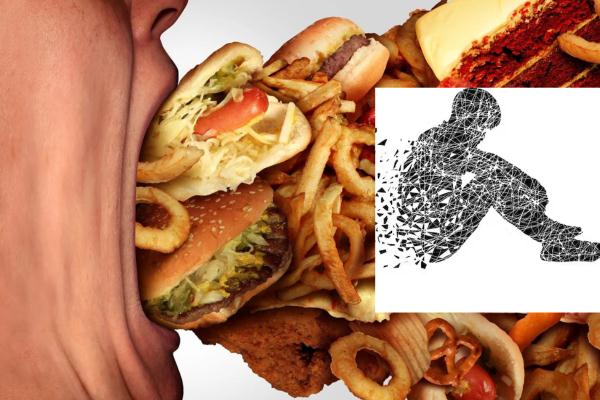In an era of fast-paced living and convenience-driven diets, a concerning link has emerged between our food choices and mental health specially depression. Recent studies have raised a compelling connection between depression and the consumption of ultra-processed foods and artificial sweeteners. In this article, we’ll explore this intriguing link and delve into the implications for our overall well-being.
Discover the striking connection between depression and the consumption of ultra-processed foods and sweeteners. Explore how your diet may influence your mental health in this enlightening exploration.
Unlocking the Relationship Between Diet and Depression
In a world where mental health is an ever-pressing concern, understanding the intricate relationship between what we consume and our emotional well-being is of paramount importance. “The Profound Link: Depression and the Impact of Ultra-Processed Foods and Sweeteners” delves into a thought-provoking aspect of this connection that deserves your attention.
Why This Matters
The choice between a wholesome meal and an ultra-processed convenience can have a far-reaching impact on our mental health. Our comprehensive exploration investigates how these dietary choices may play a crucial role in the onset and severity of depression. This subject is not only of interest to individuals looking to improve their mental well-being but also to healthcare professionals seeking alternative methods for managing depression.
What to Expect
Our article delves deep into the latest scientific research, shedding light on the impact of ultra-processed foods and sweeteners on mental health. We’ll provide insights into the potential mechanisms through which these dietary factors could influence your mood and overall mental state.
Key Takeaways
Scientific Insights: Backed by the latest research, we present findings that connect the dots between processed food consumption, sweeteners, and depression.
Practical Tips: Discover actionable advice on how to make more informed dietary choices to support better mental health.
Holistic Approach: We explore the holistic view of mental health and how diet fits into the larger picture of well-being.
Stay Informed and Empowered
By reading “The Profound Link: Depression and the Impact of Ultra-Processed Foods and Sweeteners,” you will gain valuable knowledge to make informed decisions about your diet and its potential influence on your mental health. With this information, you can take a proactive step toward better well-being.
Remember, the journey to a healthier mind starts with a single click. Read our enlightening piece today and uncover the profound connection between your diet and your mental health.
The Modern Diet Dilemma
Our dietary habits have undergone a significant transformation over the past few decades. Convenience foods, loaded with artificial ingredients, have become a staple in many households. These ultra-processed foods often contain high levels of sugar, unhealthy fats, and a myriad of additives.
The Study’s Findings
Emerging research has suggested a strong correlation between consuming these highly processed foods and an increased risk of depression. The study also highlights the potential negative impact of artificial sweeteners, commonly found in various low-calorie and diet products.
Ultra-Processed Foods and Mental Health
Ultra-processed foods, characterized by their long ingredient lists and minimal nutritional value, are thought to affect mental health through various mechanisms:
- Nutrient Deficiency: A diet high in processed foods may lack essential nutrients that are vital for brain health, such as omega-3 fatty acids, vitamins, and minerals.
- Inflammation: Processed foods are often pro-inflammatory and can lead to chronic inflammation in the body, which is associated with mood disorders, including depression.
- Blood Sugar Spikes and Crashes: These foods can cause rapid spikes and crashes in blood sugar levels, affecting mood and overall well-being.
- Gut-Brain Connection: Emerging research also suggests a strong connection between gut health and mental health. Processed foods can negatively impact the gut microbiome, potentially influencing mood.
Artificial Sweeteners and Mood
Artificial sweeteners, commonly used as sugar substitutes in diet sodas and sugar-free products, have also come under scrutiny for their potential impact on mental health:
- Neurotransmitter Disruption: Some studies suggest that artificial sweeteners can disrupt neurotransmitter function, potentially affecting mood regulation.
- Cravings and Overeating: There’s a concern that artificial sweeteners may lead to increased cravings for sweet foods, potentially causing overeating and affecting mood.
Implications for Our Well-Being
Understanding the link between depression and these dietary choices underscores the importance of a balanced and nutrient-rich diet in promoting good mental health. While it’s essential to enjoy the occasional treat, the bulk of our diets should consist of whole, unprocessed foods to support our physical and mental well-being.
Conclusion
The connection between depression and the consumption of ultra-processed foods and artificial sweeteners is a pressing issue that deserves our attention. Everyone can contribute to raising awareness and providing valuable information regarding the consumption of ultra-processed foods and artificial sweeteners causing depression problems.


